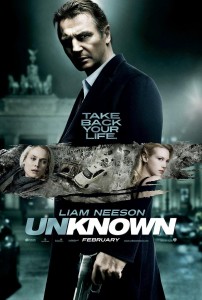By Trevor Fik (Staff Writer) – Email
 While sitting through a viewing of Liam Neeson’s most recent foray in to the thriller-chase genre Unknown, I was struck with a sense of déjà vu. Much like Neeson’s character in Unknown I was lost, grasping at straws in an attempt to corner a feeling of having been on this adventure before, only something was different. Instead of Neeson being my guide it was the infinitely sultrier Angelina Jolie in the lead role, complete with all the explosions and grandeur that accompanies most of what Jolie does.
While sitting through a viewing of Liam Neeson’s most recent foray in to the thriller-chase genre Unknown, I was struck with a sense of déjà vu. Much like Neeson’s character in Unknown I was lost, grasping at straws in an attempt to corner a feeling of having been on this adventure before, only something was different. Instead of Neeson being my guide it was the infinitely sultrier Angelina Jolie in the lead role, complete with all the explosions and grandeur that accompanies most of what Jolie does.
The similarities between Unknown and Salt are undeniable. So much so that it becomes insulting to the viewer that we were tricked in to paying admission twice for seeing what amounts to the same movie. The elements of the chase, a character sifting through an identity crisis, and pursuit by a seemingly God-like agency are present in both films, leading me to believe that certain elements were changed just to allow Neeson to slide effortlessly into the lead role.
While we are on the topic of Neeson, I do feel sorry for the characters he portrays. From getting his identity stolen and memory totally wiped out, to having his daughter kidnapped and sold in to sexual slavery, it is not a good time to be portrayed by Neeson.
The story of Unknown, with all of its potential, amounts to little more than a romp through old Berlin as Neeson’s character, Dr. Martin Harris, struggles to regain his identity. In Germany to attend a work-related conference, Harris gets in an automobile accident which leaves him in a coma for several days. When awake, he returns to the hotel he was staying at before the accident, where his wife (played with a shocking lack of emotion by January Jones) is spotted with another man who claims to be the real Martin Harris.
With the rugged charm of his looks, and soothing melancholy of his voice, Neeson displays the innate ability to garner sympathy for his characters and their plight. In Unknown, however, not even Neeson’s blazing blue eyes can make us care about his character. When you leave a film it should be with a feeling of feigned exhaustion as you have, in a way, struggled through and triumphed along with the characters on screen. In Unknown, after the conclusion is leaked (far too early), I found myself caring so little about the main character that the ending could not come soon enough.
The movie’s one saving grace, apart from featuring the always ravishing Diane Krueger, is Berlin itself. The cold war relics and cobblestone streets add a touch of mystery to the otherwise thriller by numbers film, becoming a much deeper, more complicated character than any of the actors on screen.
The sad thing about Unknown is that it had the potential to be such an invigorating, psychological thriller. It raises the question of, when everyone thinks you are insane, and you are the only person in the room to believe you are not, have you gone crazy? For example, it is something akin to being someone who saw Unknown, and in a room of rational minded people, thought it was an original, provocative film.


